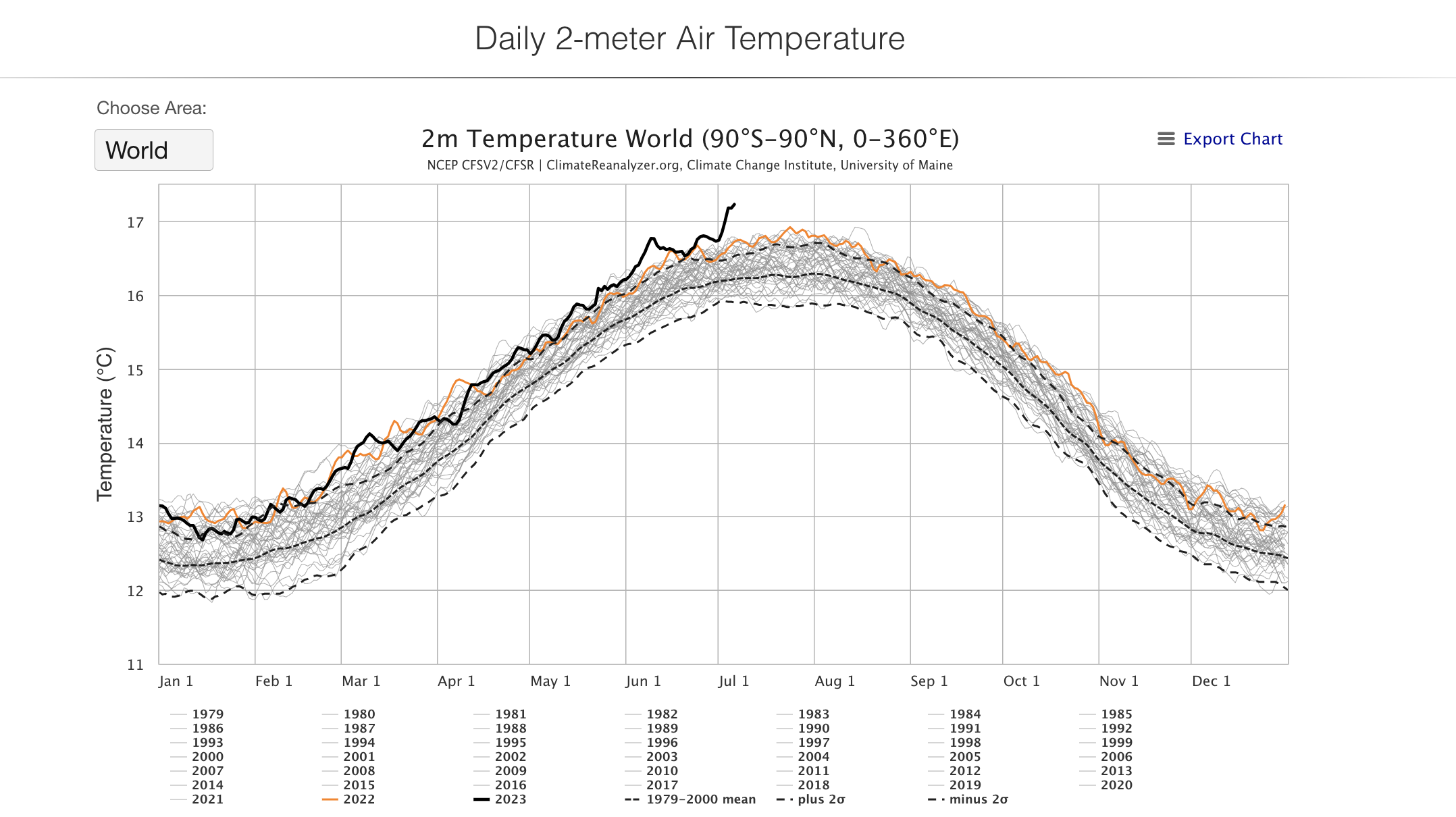Earth sets its hottest day record for third time in a week
The record is likely to be broken sooner rather than later, warn experts
Your support helps us to tell the story
From reproductive rights to climate change to Big Tech, The Independent is on the ground when the story is developing. Whether it's investigating the financials of Elon Musk's pro-Trump PAC or producing our latest documentary, 'The A Word', which shines a light on the American women fighting for reproductive rights, we know how important it is to parse out the facts from the messaging.
At such a critical moment in US history, we need reporters on the ground. Your donation allows us to keep sending journalists to speak to both sides of the story.
The Independent is trusted by Americans across the entire political spectrum. And unlike many other quality news outlets, we choose not to lock Americans out of our reporting and analysis with paywalls. We believe quality journalism should be available to everyone, paid for by those who can afford it.
Your support makes all the difference.Earth’s average temperature set a new unofficial record high on Thursday for the third time in a week.
On 6 July the Earth was an average 17.23C (63F), according to an unofficial measurement by Climate Reanalyzer, a platform that uses climate and weather forecast models to take the global temperature.
This surpassed the record of 17.18C set on Tuesday and maintained Wednesday, which in itself topped Monday’s record-breaking 17.01C.
The figures must be confirmed by official international and national government bodies but nevertheless have set off alarm bells in the scientific community.
“Such records are the predictable consequence of a short-term El Nino temperature boost coming on top of the long-term global warming trend due to mankind’s greenhouse gas emissions,” tweeted Dr Robert Rohde, the lead scientist at the climate nonprofit, Berkeley Earth. “Global warming is leading us into an unfamiliar world,” he added.
Wherever you look around the world, there is a litany of new extremes. The African continent experienced its hottest night ever recorded, according to US Stormwatch, which tracks extreme weather globally. The nighttime low in Adrar, Algeria, was 39.6C (103.3F) on Thursday.
Cities across China opened air-raid shelters on Friday to offer residents relief from severe heat as deaths were reported in Beijing and Shaoxing. Earlier this week, the Chinese capital reported more than nine straight days with record-high temperatures exceeding 35C (95F), according to the National Climate Centre, compounded by drought.
In the UK, the Met Office issued a heat health alert for six regions as temperatures are set to soar to 30C this weekend. The warnings were directed to six regions – London, Yorkshire, east and west Midlands, and the east and southeast of England – from midday on Friday until 9am on Sunday.
Germany warned the elderly, people with health conditions, pregnant women and parents with young children to seek out cool places amid forecasts for 35-37C (95-99F) this weekend combined with high humidity.
Germany’s health ministry urged people to stay indoors, consume enough liquids and avoid strenuous activity, particularly during the day.

In the Antarctic, temperatures soared to unprecedented levels, reaching as high as 4.5C (8F) above normal in the polar region.
Dr Friederike Otto, a climate science lecturer at the Grantham Institute for Climate Change and founder of World Weather Attribution (WWA) which assesses the role of global heating in extreme weather, called the new heat records “a death sentence”.
“This is not a milestone we should be celebrating, it’s a death sentence for people and ecosystems,” she said this week. “And worryingly, it won’t be the hottest day for a long time.

“With El Niño developing, the world will likely break this record again in the coming months. We absolutely need to stop burning fossil fuels.”
The scorching heat is being driven by emissions caused by burning fossil fuels, as well as El Nino – a cyclic climate pattern which means severe temperatures in many places.
The new record average is more than 1C higher than on the same day 30 years ago, when global temperatures had already been influenced by the climate crisis.
Along with intense and earlier heatwaves, the high temperatures are contributing to larger wildfires, erratic rainfall and stronger cyclones. Extreme weather is hitting the world’s poorest communities the hardest, despite their negligible contributions to global emissions.




Join our commenting forum
Join thought-provoking conversations, follow other Independent readers and see their replies
Comments